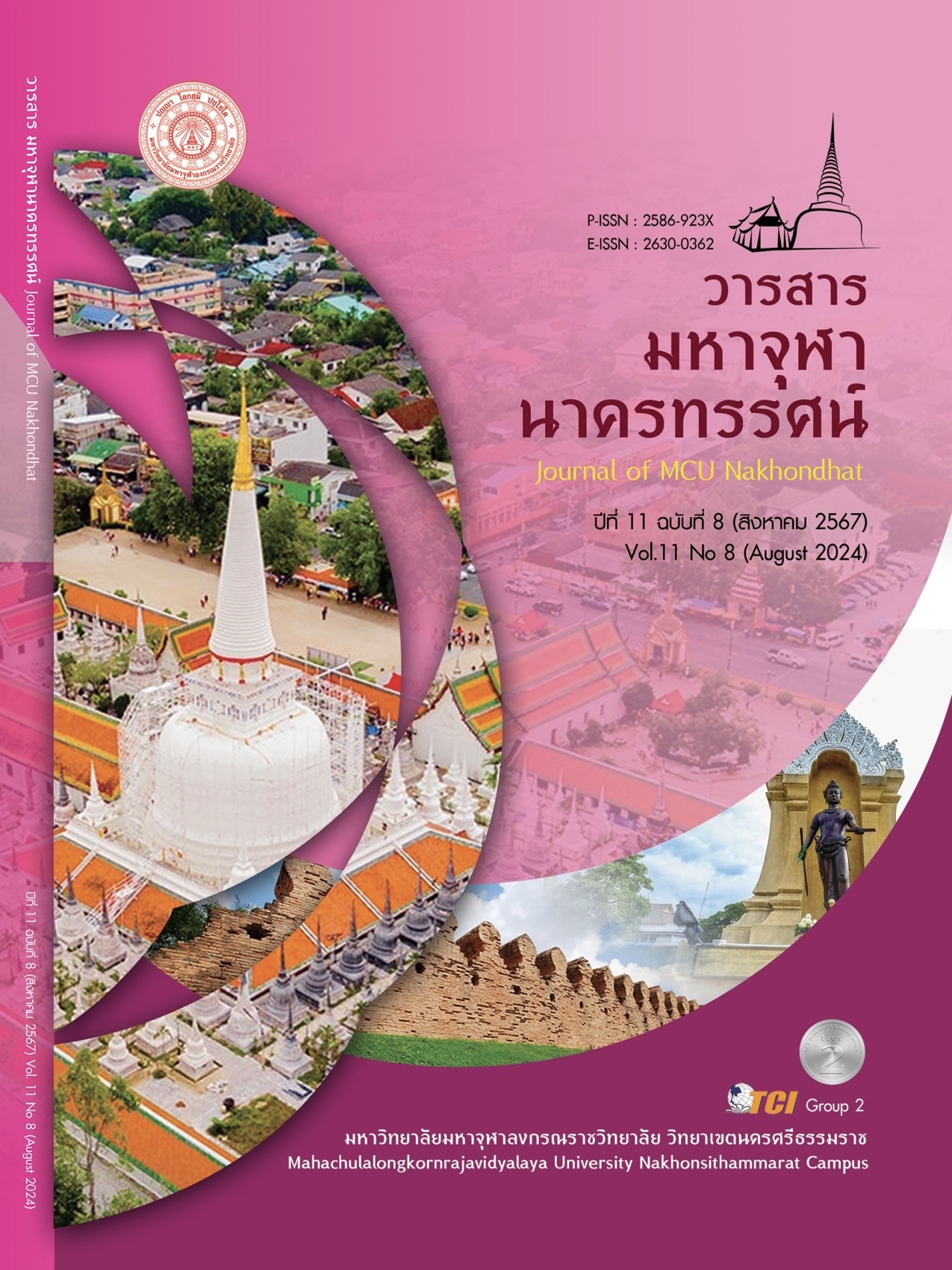THE LEARNING MANAGEMENT USING PROBLEM BASE LEARNING WITH TEAM GAME TOURNAMENT TECHNIQUE ON MATHEMATICAL PROBLEM SOLVING ABILITY OF GRADE 11 STUDENTS
Main Article Content
Abstract
The purpose of this study were 1) To compare mathematical problem-solving ability of grade 11 students before and after using Problem–Based Learning with Team Game Tournament technique 2) To compare mathematical problem-solving ability of grade 11 students after using Problem–Based Learning with Team Game Tournament technique to the criterion of 70%. The experimental method is Quasi-Experimental Research by One Group Pretest–Posttest Design. The sample of this study included 30 of eleventh gradestudents studying in the second semester of 2023 academic year at Srinakharinwirot University Prasarnmit Demonstration School (Secondary). They were selected by using the cluster random sampling technique and using the classroom as the unit of randomization. The duration of the research was 12 periods. The instruments used in this study were lesson plans and mathematical problem-solving ability test. The statistics procedures used for data analysis were mean, standard deviation, t-test for dependent samples and t-test for one samples. The results showed that 1) The mathematical problem-solving ability of grade 11 students after was higher than before using Problem–based learning with Team Game Tournament Technique at a statistically significant level of .05, 2) The mathematical problem-solving ability of grade 11 students was higher than the criterion of 70% after using Problem-based learning with Team Game Tournament Technique with a statistically significant level of .05.
Article Details

This work is licensed under a Creative Commons Attribution-NonCommercial-NoDerivatives 4.0 International License.
References
กรมวิชาการ กระทรวงศึกษาธิการ. (2546). การจัดสาระการเรียนรู้ กลุ่มสาระการเรียนรู้คณิตศาสตร์ ชั้นมัธยมศึกษาปีที่ 1-6 ตามหลักสูตรการศึกษาขั้นพื้นฐาน พุทธศักราช 2544. กรุงเทพมหานคร: องค์การรับส่งสินค้าและพัสดุ.
จรรยา หารพรม. (2560). การพัฒนาผลการเรียนรู้คณิตศาสตร์และพฤติกรรมการทำงานกลุ่ม โดยการจัดการเรียนรู้แบบ STAD ร่วมกับ KWDL ของนักเรียนชั้นประถมศึกษาปีที่ 3. ใน วิทยานิพนธ์ศึกษาศาสตร์มหาบัณฑิต สาขาวิชาหลักสูตรและการนิเทศ. มหาวิทยาลัยศิลปากร.
ทิศนา แขมมณี. (2564). ศาสตร์การสอน: องค์ความรู้เพื่อการจัดกระบวนการเรียนรู้ที่มีประสิทธิภาพ. (พิมพ์ครั้งที่ 25) กรุงเทพมหานคร: สำนักพิมพ์แห่งจุฬาลงกรณ์มหาวิทยาลัย.
มัณฑรา ธรรมบุศย์. (2545). การพัฒนาคุณภาพการเรียนรู้โดยใช้ PBL (problem-based learning). วารสารวิชาการ, 5(2), 11-17.
เมลดา รุ่งเรือง. (2562). ผลสัมฤทธิ์ของการจัดการเรียนรู้แบบร่วมมือโดยใช้เทคนิค TGT และ STAD ในรายวิชาคณิตศาสตร์สำหรับนักเรียนมัธยมศึกษา. ใน วิทยานิพนธ์วิทยาศาสตรมหาบัณฑิต สาขาคณิตศาสตร์ศึกษา. มหาวิทยาลัยศิลปากร.
วาสนา ภูมี. (2555). ผลของการจัดการเรียนรู้โดยใช้ปัญหาเป็นฐาน (Problem-based learning) เรื่องอัตราส่วน และร้อยละ ที่มีต่อความสามารถในการแก้ปัญหาทางคณิตศาสตร์ และความสามารถในการให้เหตุผลทางคณิตศาสตร์ของนักเรียนชั้นมัธยมศึกษาปีที่ 2. ใน วิทยานิพนธ์การศึกษามหาบัณฑิต สาขาวิชาการ มัธยมศึกษา. มหาวิทยาลัยศรีนครินทรวิโรฒ.
สถาบันส่งเสริมการสอนวิทยาศาสตร์และเทคโนโลยี. (2551). ทักษะ/กระบวนการทางคณิตศาสตร์. (พิมพ์ครั้งที่ 2). กรุงเทพมหานคร: สถาบันส่งเสริมการสอนวิทยาศาสตร์และเทคโนโลยี กระทรวงศึกษาธิการ.
สถาบันส่งเสริมการสอนวิทยาศาสตร์และเทคโนโลยี. (2555). ทักษะและกระบวนการทางคณิตศาสตร์. (พิมพ์ครั้งที่ 3). กรุงเทพมหานคร: 3-คิว มีเดีย.
สถาบันส่งเสริมการสอนวิทยาศาสตร์และเทคโนโลยี. (2567). ผลการประเมิน PISA 2022 : บทสรุปสำหรับผู้บริหาร. กรุงเทพมหานคร: สถาบันส่งเสริมการ สอนวิทยาศาสตร์และเทคโนโลยี กระทรวงศึกษาธิการ.
สำนักวิชาการและมาตรฐานการศึกษา. (2552). ตัวชี้วัดและสาระการเรียนรู้แกนกลางกลุ่มสาระการเรียนรู้ คณิตศาสตร์ตามหลักสูตรแกนกลางการศึกษาขั้นพื้นฐานพุทธศักราช 2551. (พิมพ์ครั้งที่ 1). กรุงเทพมหานคร: สำนักวิชาการและมาตรฐานการศึกษา กระทรวงศึกษาธิการ.
อิสริยา ปรมัตถากร. (2562). การพัฒนากิจกรรมการเรียนการสอนที่เสริมสร้างความสามารถในการสร้างตัวแบบเชิงคณิตศาสตร์เพื่อแก้ปัญหาในชีวิตจริงสำหรับนักเรียนระดับมัธยมศึกษาตอนต้น. ใน วิทยานิพนธ์การศึกษามหาบัณฑิต สาขาคณิตศาสตร์ (กศ.ด). มหาวิทยาลัยศรีนครินทรวิโรฒ.
Mccarthy, D. S. (2001). A teaching experiment using problem-based learning at the elementary level to develop decimal concepts. Dissertation Abstracts. Retrieved April 20, 2022, from https://www.thailis.uni.net.th/dao/detail.nsp.html
Walton, H. J. & Matthews, M. B. (1998). Essentials of Problem-Based Learning. Medical Education, 2(3), 456-459.


